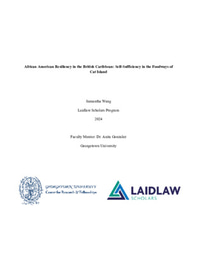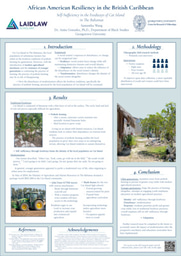Outline: Examining Expressions of Black Resilience in the Culture of Cat Island
Title: Examining Expressions of Black Resilience in the Culture of Cat Island
Abstract:
Cat Island in The Bahamas is considered by many to be Christopher Columbus’s first landing site in the New World, marking the start of exchange across the Atlantic Ocean. Thus, Cat Island is an appropriate location to analyze the response of Black populations to the consequences of Transatlantic exchange, including experiences pertaining to forced migration and the legacy of slavery. The research project aims to document the resilience of Black populations that reside on Cat Island through an exploration of the island’s culture. Specifically, the main focus will be placed on traditional foodways and expressive forms of culture practiced by residents. Furthermore, the project looks to analyze the process in which cultural knowledge on Cat Island is transmitted from one generation to the next and the factors that cause the transmitted content to change. To collect research, the project uses ethnographic field research methods which take place in The Bahamas. The primary approaches include oral interviews with Cat Island residents and observations of cultural practices. In face of contemporary threats like urbanization and global warming that threaten the survival of Bahamian culture, the project aims to preserve and expand access to the legacy of resilience that has developed on the islands.
Research Objectives & Questions:
The primary objective of the research project is to examine Black resilience in the British Caribbean. The project aims to analyze how Black communities on Cat Island in The Bahamas have adapted to the Americas, as exhibited in the island’s culture. Specifically, the focus is on foodways, which involve traditions related to the methods of preparing and consuming food, and expressive culture, which encompasses aspects of self-expression like art and music. The secondary objective of the project is to explore the transmission of culture between generations on Cat Island, exploring how the imparted cultural knowledge changes and the factors that contribute to the changes. The key questions behind the research project are:
- How does the culture of Cat Island contribute to the resilience of Black populations on the island?
- How is cultural knowledge on Cat Island passed down through generations? What factors influence the process of transmission and the imparted knowledge?
Background:
The Black populations that reside in The Bahamas now are largely descended from former slaves that survived forced migration from the continent of Africa during earlier centuries (Gibson, 1999). When in the Americas, the Black populations developed a culture that adapted their African heritage to their new physical environment. Furthermore, legacies of colonialism by western European powers in the Americas influenced the culture of Black communities (The Government of The Bahamas, 2011).
Previous work, conducted by Professor Anita Gonzalez, focused on African American communities in the Chesapeake Bay region of the United States. Specifically, the emphasis was on the foodways, cultural traditions, and familial histories present on the eastern shore of Maryland. The research project on Cat Island this summer builds upon the prior research, allowing for a comparison between the experiences of Black populations in the United States and those in the British Caribbean. The goal is to gain a broad illustration of Black resilience in the Americas.
Methodology:
The project uses the approaches within ethnographic field research. In studying residents of Cat Island in their daily environment, the project aims to gain an authentic view of their culture and traditions. The two primary research methods are oral interviews and observations made during participation in cultural traditions. The researchers will meet around 10 Cat Island residents on their property in a face-to-face format. Interviews with a projected duration of 60 minutes will take place with each resident. The researchers will focus the interview questions on personal life, family history, cultural traditions with specific references to foodways, and the transmission of knowledge between generations. The audio recordings of each interview will then be uploaded to a digital file and transcribed into text. While participating alongside Cat Island residents in their daily activities, the researchers will take photographs and videos of the experience. Reflective thoughts after the experience will be documented in the form of journal entries. The visual and written media will be uploaded to a digital file. The qualitative data will then be used to analyze patterns in the cultural practices of Cat Island. Overall, the methodology of the project has not changed since the initial project proposal.
Potential Impact:
In The Bahamas during recent years, there has been an increased migration of younger generations away from less economically developed islands like Cat Island and toward urban centers where tourism, the main industry supporting the nation’s economy, is most prominent. As a result, fewer young Bahamians have remained on Cat Island to retain the cultural traditions of their ancestors. Furthermore, the effects of global warming, such as rising sea levels, threaten the existence of low-lying island nations. The Bahamas already face the devastating impacts of hurricanes, which are likely to become more severe and unpredictable in the future. Contemporary factors like urbanization and climate change jeopardize the transmission and survival of Bahamian culture. In face of these threats, the project seeks to detail and thus preserve the cultural traditions that formed on Cat Island. The island’s culture illustrates how Black populations have adapted after forced migration and enslavement, adding to the field of Black and African American studies.
Resources & Support Needed:
Mentorship on how to accurately depict the experiences of individuals studied with ethnographic research methods would be greatly appreciated. Furthermore, feedback on the published analysis of collected research would be beneficial.
Please feel free to offer feedback or ask questions regarding the research project.


Please sign in
If you are a registered user on Laidlaw Scholars Network, please sign in